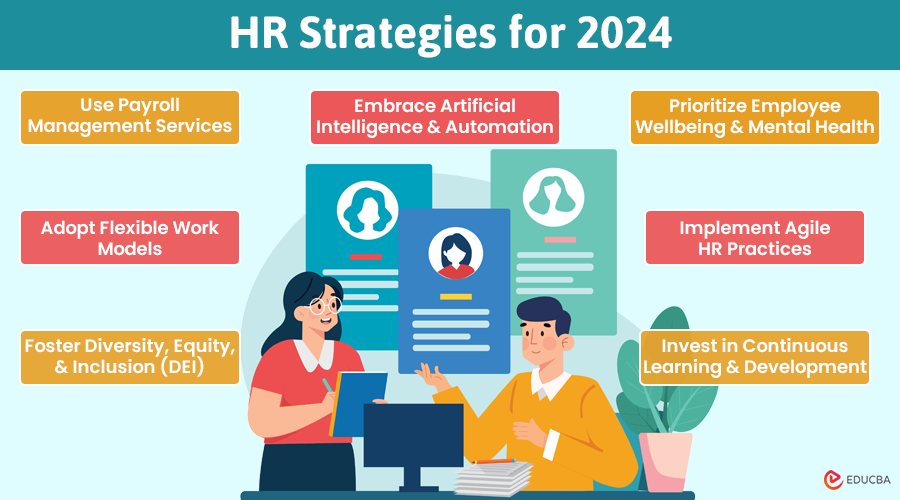What are the HR Strategies for 2024?
The world of Human Resources (HR) is changing rapidly. HR professionals must stay ahead with new AI technologies, shifting workforce expectations, and evolving workplace trends. To help you navigate this dynamic environment, we have outlined key HR strategies for 2024. Whether you want to streamline payroll processes or enhance employee experience, these tips will help you create a successful and forward-thinking HR approach in 2024.

Top 11 HR Strategies for 2024
Here are some top HR strategies for 2024:
1. Use Payroll Management Services
Using outsourced HR and payroll services can significantly improve efficiency and accuracy. These services use expert knowledge and advanced technology to make payroll processes more efficient and ensure compliance with new regulations. This decreases the risk of mistakes and allows HR teams to concentrate on more strategic tasks. Additionally, outsourced payroll services provide scalability, making managing workforce changes and growth easier without the burden of handling complex payroll tasks internally.
2. Embrace Artificial Intelligence and Automation
Artificial Intelligence (AI) and automation are revolutionizing HR processes. These technologies streamline operations, minimize human error, and enable HR professionals to concentrate on strategic tasks. AI-powered recruiting tools efficiently screen resumes, identify top talent, and predict employee turnover, leading to more informed decision-making and a more efficient HR department.
3. Prioritize Employee Wellbeing and Mental Health
Employee well-being and mental health have become top priorities for businesses. A happy and healthy workforce works better and stays more engaged, prompting companies to adopt various strategies to support their employees. These strategies include:
- Comprehensive Wellness Programs: Implementing programs that address physical, mental, and emotional health.
- Mental Health Resources: Providing access to counseling, therapy, and other mental health services.
- Work-Life Balance: Encouraging flexible working hours and remote work options to help employees balance their professional and personal lives.
- Regular Check-ins and Surveys: Conduct frequent assessments to gauge employee satisfaction and identify improvement areas.
4. Adopt Flexible Work Models
The shift to remote and hybrid work is gaining momentum. As employees place greater importance on flexible work options, companies need to adapt to keep their top talent. Key strategies include:
- Creating strong remote work policies
- Investing in effective collaboration tools
- Ensuring remote employees feel included and engaged
Implementing flexible work models can boost both productivity and job satisfaction.
5. Foster Diversity, Equity, and Inclusion (DEI)
Fostering Diversity, Equity, and Inclusion (DEI) is crucial for a successful HR strategy. Companies focusing on DEI build a more inclusive culture, enhance innovation, and boost employee morale. Key strategies include:
- Implementing unbiased recruitment processes
- Providing ongoing DEI training
- Establishing employee resource groups
Tracking and reporting DEI metrics is essential for monitoring progress and ensuring accountability.
6 . Implement Agile HR Practices
Agile methodologies, first used in software development, are now applied to Human Resources (HR). Agile HR involves using flexible and iterative processes that adapt quickly to changes. This approach promotes teamwork, ongoing feedback, and fast problem-solving. Adopting agile HR practices makes the HR department more responsive and better aligned with the business’s needs.
7. Invest in Continuous Learning and Development
Investing in continuous learning and development is important in this competitive world, where skills can quickly become outdated. To stay competitive, it is important to:
- Provide opportunities for upskilling and reskilling.
- Offer access to online courses.
- Foster a culture of continuous improvement.
Leadership development programs are crucial for preparing future leaders and ensuring long-term success.
8. Leverage HR Analytics
HR departments are increasingly using analytics to guide their decisions. HR analytics offer valuable insights into workforce aspects, such as employee engagement and performance metrics. Using these insights, HR professionals can make better decisions, spot trends, and tackle potential problems before they grow. Advanced HR analytics tools can revolutionize HR operations, making them more strategic and proactive.
9. Enhance Employee Experience (EX)
Enhancing Employee Experience (EX) is essential for attracting and keeping talent. A great EX ensures employees feel appreciated, engaged, and supported throughout their time with the company. Key elements include personalized onboarding, regular feedback, and career development opportunities. Prioritizing EX can boost job satisfaction, improve performance, and reduce turnover.
10. Strengthen Employer Branding
A strong employer brand significantly improves a company’s ability to attract top talent. In 2024, effective employer branding will go beyond traditional marketing and recruitment efforts. It will focus on creating a positive workplace, highlighting company values, and sharing success stories. Use social media, employee testimonials, and industry awards to raise your reputation as an employer.
11. Emphasize Sustainability and Corporate Social Responsibility (CSR)
Sustainability and CSR are growing priorities for both employees and consumers. Companies prioritizing these values can boost their reputation and attract socially conscious talent. HR can support this by:
- Integrating Sustainability: Infusing sustainability into the company culture.
- Promoting Green Initiatives: Encouraging eco-friendly practices.
- Supporting Volunteerism: Facilitating opportunities for employees to get involved in community service.
Transparent reporting on CSR activities can also strengthen trust and loyalty among stakeholders.
Final Thoughts
In 2024, HR is changing quickly and facing new challenges. To keep up and succeed, HR professionals should use strategies like AI and automation, focus on employee wellbeing, and promote continuous learning. Adapting to these trends will help create a more effective, inclusive, and innovative HR department. Staying ahead of trends and adjusting to new realities will be crucial for long-term success.
Recommended Articles
We hope you found this guide on “HR Strategies for 2024” helpful. Check out these recommended articles for more insights into effective HR practices and trends.

